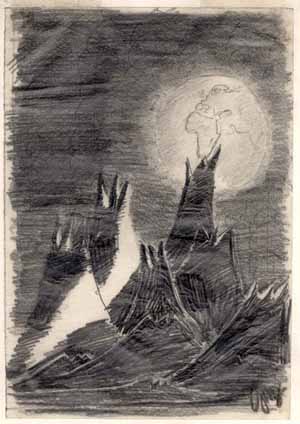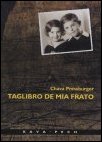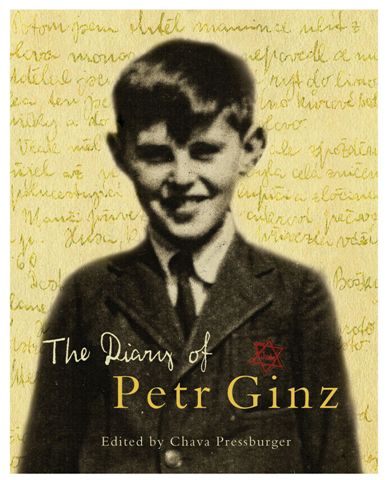2007-02-06
The diary of Petr Ginz will soon be published in English
The subject of my first posts, in my two blogs both in Spanish and in Esperanto, was the figure of a young Jewish boy who died during the Holocaust, and who had a close relationship with the international language. He was a very talented boy in all respects and surely there is no better way to start with my blog in English than to present his story.
Petr Ginz, born in Prague in 1928, was deported to the Terezín concentration camp (Theresienstadt, now in the Czech Republic), during the Nazi invasion. At age fifteen, he was sent to Auschwitz, where he died of typhus.
Young Petr, of Czech Jewish origin, was the son of a mixed pair, his father being a well-known Esperantist activist Ota Ginz. According to all available information, he was a boy of great talent, who published a magazine during his time in the concentration camp, wrote up various papers, among which is a diary (the reason why some in the media have used the expression "the Czech Ana Frank", to refer to him), and left many drawings.
His name appeared in the media on the occasion of the 60th anniversary of the liberation of Auschwitz, and opportunity was taken to publish some of his writings. In particular, the International Herald Tribune dedicated an extensive news article to him, in which it was mentioned that Petr himself was an Esperantist and that during his stay in the concentration camp, he dedicated part of his time to writing a Czech-Esperanto dictionary.
 Also some Esperanto publications devoted attention to the topic; for instance, the electronic magazine “Libera Folio” published an article with the suggestive title “the Esperantist who traveled from the ghetto into space”. The reason for this title was an accidental circumstance, which had made Petr's name very famous two years before: in the tragedy of the Columbia Shuttle the 16th of January 2003, among the dead was an Israeli astronaut, Ilan Ramon, the first from that country. He had taken into space a drawing Petr Ginz had made in the concentration camp. The drawing represented a peculiar vision of the Earth from mountains in the moon, and it became a symbol of the Holocaust.
Also some Esperanto publications devoted attention to the topic; for instance, the electronic magazine “Libera Folio” published an article with the suggestive title “the Esperantist who traveled from the ghetto into space”. The reason for this title was an accidental circumstance, which had made Petr's name very famous two years before: in the tragedy of the Columbia Shuttle the 16th of January 2003, among the dead was an Israeli astronaut, Ilan Ramon, the first from that country. He had taken into space a drawing Petr Ginz had made in the concentration camp. The drawing represented a peculiar vision of the Earth from mountains in the moon, and it became a symbol of the Holocaust.
 Even more curious is the fact that all this fame led to the discovery of Petr's diary in a hidden box in an attic in Prague. The diary was published in Czech, and almost immediately in Esperanto, under the supervision of his sister Eva (now Chava Pressburger) who survived the Holocaust and currently lives in Israel.
Even more curious is the fact that all this fame led to the discovery of Petr's diary in a hidden box in an attic in Prague. The diary was published in Czech, and almost immediately in Esperanto, under the supervision of his sister Eva (now Chava Pressburger) who survived the Holocaust and currently lives in Israel.
The diary was published some months ago in Spain, both in Spanish and in Catalan. I had the occasion to attend the presentation in Madrid, in which his sister participated. I had the opportunity to remember with her (in Esperanto) the figure of their father, Ota Ginz, who was very active in the Esperantist movement in the period between both World Wars. Among other activities, he compiled an anthology of Czechoslovakian Literature, and translated various texts from Esperanto into Czech, among which was one that would be a success in many countries, “At least I understand the radio”. In fact, the foreword of Petr's book mentions the fact that their parents had met in a congress of Esperantists.
 Now, I have just discovered that the diary is about to be published in English, with the title "The Diary of Petr Ginz" (Atlantic Monthly Press, scheduled for March 2007)
Now, I have just discovered that the diary is about to be published in English, with the title "The Diary of Petr Ginz" (Atlantic Monthly Press, scheduled for March 2007)
With respect to the book, I cannot but recommend it. For me, its most striking characteristic is the way in which Petr speaks about terrible things, as though they were not very important, as if they were everyday matters. It is amazing that next to phrases like “It is raining” or “School this morning”, appear commentaries like “Today I have been going walking on street XX because YY has been prohibited for the Jews”, as if this were a normal thing. It is clearly not, and Petr himself writes in a paragraph that “What now is totally current, would have been a motive for scandal in a normal time”, but the impression left to the reader is one of a pure routine, as if one could get accustomed to anything.
It is the same sensation you get after reading “Fateless”, by Imre Kertész. And also another less known book, one that was published for the first time in Esperanto, and conserved its name in the English translation: “Maskerado”, the memories of Tivadar Soros, the father of George, the famous financier. In fact there are many things in common between George Soros and Petr Ginz: both were young Central European Jews, very talented, sons of renowned Esperantists, persecuted by the Nazis. Fortunately George survived, and it is the most regrettable that Petr was not able to fulfill what he surely would have been able to achieve (and I am not speaking about some of the most controversial actions by Soros, which I dealt with in a specific blog post in Spanish and also in Esperanto).
It is somehow odd that the English version of the Diary will appear after those in Spanish, Catalan and Esperanto. It will arrive sixty years too late.
(Thanks to Ken for the corrections).

